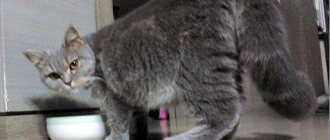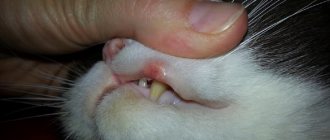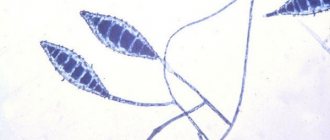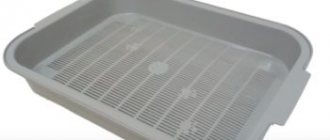Infectious (viral) feline peritonitis (ICP, or FIP from the English feline infectious peritonitis) is a serious problem for those who have several cats in their home or for those who run a cattery.
Feline viral peritonitis is most often referred to as infectious peritonitis (IPI). Infectious peritonitis has become most widespread over the past 10-20 years. This disease first appeared in the United States in the early 60s of the last century. However, many believe that it could have arisen back in the early 50s. First of all, this could be due to the growth of the cat population in large cities. This disease, as a rule, does not threaten cats, which are the only pets of their owners. But it should be noted that feline infectious peritonitis is a fatal disease. FIP is caused by a virus that is classified as a corona virus. The complexity of the problem is that there are many types of coronaviruses, but some of them cause disease and some do not. Most pathogenic coronaviruses cause only short-term diarrhea in kittens. Unfortunately, it is currently impossible to determine what type of coronavirus a cat is infected with - practically harmless or deadly, causing FIP. A veterinarian may say that a sick cat is infected with coronavirus, but will not be able to say—until it is too late—that the cat has FIP. In addition, new evidence is emerging that “virtually safe” coronaviruses can quickly mutate, turning into very dangerous FIP viruses. Hence the conclusion: there is no reliable way to protect a cat from FIP. This virus is quite persistent and can remain active indoors for weeks or even months.
The only consolation is that the virus is easily destroyed by ordinary disinfectants and detergents, so it is very important to adhere to basic hygiene rules.
FIP: General information about the disease
FIP disease in cats: what is it? This question arises for those owners whose pet has been diagnosed with this.
Feline infectious peritonitc is translated as infectious or viral peritonitis of representatives of the cat family. The suspected causative agent of this disease is the FECV coronavirus, which is considered relatively safe. Under certain conditions affecting the cat’s body, it begins to mutate. As a result, the virus leads to serious disorders in the animal’s body and its death. Scientists have still not been able to figure out how the disease develops, so diagnosing it in the early stages is almost impossible.
"Important information! According to veterinary statistics, FECV coronavirus was detected in 28% of cats living in groups and in 15% of pets living alone.”
Statistics make it clear that coronavirus in cats cannot be considered a rare phenomenon, but it should be noted that in 2% of cases it still leads to the development of FIP. Diseases of viral etiology are dangerous because infectious agents are very stable and can remain dormant for a long time.
Most often, the FIP virus in cats is diagnosed in kittens or adults under two or after ten years of age. Virological studies prove that the virus often affects animals with weakened immune systems.
Unfortunately, in 98% of cases, viral peritonitis is fatal. It is almost impossible to prevent infection with a deadly virus, since it is not known for certain what factor leads to its mutation.
Methods of infection with coronavirus
It is generally accepted that animals that live in large groups on the street, at home or in nurseries are at greater risk. Some of them may be carriers of the virus and gradually infect other animals. Other cats can live with the virus for the rest of their lives, while in others the coronavirus mutates and leads to the development of infectious peritonitis. Most often, the disease is diagnosed in kittens aged from four months to six months.
It is very important to promptly determine the source of infection and do everything to prevent the spread of the disease.
An animal can become infected with FIP:
- in utero;
- during mating with an infected animal;
- by contact in contact with feces or saliva of a sick animal.
"Note! Carriers of FIP infection in cats often give birth to sick offspring that die before birth or after birth.”
But it also happens that several kittens survive and become carriers of the disease, infecting other animals. It is recommended to sterilize virus carriers and protect them from contact with relatives.
A relatively safe coronavirus can mutate due to:
- severe stress experienced by the animal;
- pregnancy;
- mating;
- genetic predisposition to viral peritonitis;
- weak immunity.
In the external environment, coronavirus can be destroyed by treating the room with detergents containing chlorine. By treating a room with a sick animal in this way every day, you can minimize the risk of infecting other cats.
The symptoms and treatment of FIP in cats can vary significantly. Everything will depend on the form of the disease, the general condition of the animal, its individual characteristics and immune system.
Signs of FIP
In veterinary medicine, there are 2 types of FIP: wet and dry peritonitis. The complexity of the course of the disease largely depends not only on the above-mentioned root causes, but also on associated factors (bacterial infections, chronic diseases, method of treatment, and so on).
READ Decorative Ferret Pet Compatible
Clinical symptoms of infectious peritonitis in cats:
- depressed state, painful appearance;
- partial loss of appetite;
- photophobia;
- changes in body temperature from high (over 40°C) to low (less than 38°C) and vice versa;
- vomit;
- prolonged diarrhea;
- labored breathing;
- bloating due to large accumulation of fluid in the abdomen;
- gradual or sudden weight loss (protruding ridge, thin paws);
- structural changes in the skin (dryness, yellowness, hair loss, scab formation);
- necrogranulomatous lymphadenitis;
- damage to the central nervous system (symptoms of rheumatism, meningitis, fearfulness, impaired coordination of movements).
Gradually the ward weakens, his vitality fades, and he dies. Unfortunately, no veterinarian can guarantee the recovery of a cat when diagnosed with infectious peritonitis.
Forms of viral peritonitis
Viral peritonitis is divided into two types, each of which has its own symptoms, course and chances of cure. FIP happens:
- wet. The wet form of peritonitis is an acute type of pathology. During its development, the vascular system is damaged and protein leakage is observed, provoking the accumulation of transudate in the abdominal, pleural or pericardial cavity. This condition develops from two to four months and in 98% of cases ends in death for the animal.
- dry The dry form of FIP in cats is considered chronic and leads to the formation of plaques on internal organs. Diagnosed in animals with strong immunity. The severity of the development of the disease will depend on the organ in which the infectious process develops. The development of the disease lasts up to six months. Dry FIP in cats has a more favorable prognosis as it can be put into remission.
Most often, the wet form of the pathology is diagnosed. In veterinary practice, cases are sometimes recorded when two forms of the disease develop simultaneously.
Symptoms of viral peritonitis
Infectious peritonitis can occur in different ways in an animal. Everything will depend on the intensity of the pathology, the condition of the body and the age of the cat.
The incubation period for the development of the virus in the body can last from a couple of weeks to several months, depending on the number of viral agents and the state of the animal’s immune system.
Clinical signs of FIP in a cat can vary and depend on its form.
Symptoms of exudative viral peritonitis are presented:
- the presence of ascites;
- impaired respiratory function due to accumulation of exudate in the pleural cavity;
- fever;
- lethargy, lack of appetite, development of anorexia;
- renal failure, abnormalities in the functioning of the pancreas and liver;
- enlargement of mesenteric lymph nodes and liver borders;
- nausea and vomiting.
Symptoms of non-exudative viral peritonitis are presented:
- lack of appetite, anorexia;
- damage to the central nervous system, vestibular disorders, seizures, urinary incontinence, behavioral changes;
- eye nystagmus;
- enlargement of mesenteric lymph nodes and liver borders;
- formation of pyogranulomas in the kidneys;
- enlarged colon;
- bowel disorder.
Despite drug therapy, over time the animal begins to weaken, vitality fades, and ultimately death occurs. In rare cases, remission can be achieved. When diagnosing FIP, no veterinarian will guarantee a cat’s recovery, since in most cases, when this pathology is detected, death occurs.
Symptoms of the disease
Infectious peritonitis belongs to the category of slowly developing diseases. The pathology does not manifest itself for a long time, and then the clinical picture develops rapidly within a few days.
Most animals have a wet form of the disease. Dry is less common and is accompanied by acute inflammatory processes in the organs. In almost every case, the disease ends in death.
Loss of appetite and interest in games are common symptoms
Symptoms of FIP:
- lethargy;
- elevated temperature;
- anemia;
- weight loss;
- enlarged abdomen;
- nausea and vomiting;
- bowel disorder.
The pathology affects the central nervous system, liver and kidneys.
How to determine temperature in cats?
Diagnosis of the disease
FIP is a difficult disease to diagnose. Since the diagnosis of FIP in cats at the initial stage is difficult to make due to the lack of specific symptoms, it is often confused with other pathologies. Wet peritonitis has a similar clinical picture with the bacterial form of the disease, renal ascites, heart failure and toxoplasmosis. And dry with lymphosarcoma and tuberculosis.
Pathology can be diagnosed by:
- blood test for FIP;
- X-ray;
- ultrasound examination of internal organs;
- biopsy of exudate or affected tissue.
The most reliable method is histology of the affected tissue structures. A general blood test has low information content, since it only allows you to determine the presence of antibodies to coronavirus, but it does not make it possible to recognize which strain has infected the animal. A positive result will confirm the presence of viral activity, but will not distinguish peritonitis from enteritis.
Prevention of peritonitis in animals
Veterinary experts recommend following the rules to prevent the development of a dangerous disease:
- Do not allow animals to be kept crowded.
- Limit free range.
- Disinfect the room regularly.
- Follow the norms and rules of feeding.
- Increase immunity.
- Follow recommendations for postoperative care.
We recommend reading about endometritis in cats. You will learn about the reasons for its development, forms of endometritis, symptoms, complications, diagnosis and treatment. And here is more information about the causes and treatment of vomiting in cats.
FIP treatment
Is there a cure for FIP in cats? It is difficult to answer this question. Long-term remission can be achieved, but in most cases the pathology is fatal. The disease cannot be cured, so veterinarians carry out supportive treatment, in which they prescribe drugs from various groups, including:
- antiviral;
- antibiotics;
- cardiotonics;
- immunostimulants;
- diuretics;
- corticosteroids;
- drugs that prevent potassium leaching;
- vitamins.
In severe cases, a blood transfusion is prescribed, and if fluid accumulates in the peritoneum or chest, it is pumped out. Pumping out the fluid is a temporary measure, since after some time it is collected again. With frequent pumping of exudate, potassium is washed out of the body, which causes irreparable harm to it.
In America, the dry form of viral peritonitis is successfully treated by administering special drugs to the animal. Russian veterinarians have invented the drug “Fosprenil,” which can induce remission and improve the condition of a sick animal.
It is introduced into the abdominal cavity after pumping out the fluid or using an oral or rectal form of administration. Two weeks after administration of the drug, cats experience progressive remission and vital signs stabilize. And in 5% of cases, animals recover completely. However, this drug does not help everyone, so often when a diagnosis of viral peritonitis is made, doctors recommend that the cat’s owner undergo euthanasia.
Treatment of peritonitis in cats
Therapeutic measures for the disease are complex. First of all, the sick animal is prescribed painkillers - Baralgin, Spazgan, etc. As recommended by your doctor, you can apply cold compresses to the abdominal area.
Viral
There is no specific therapy for coronavirus peritonitis in veterinary practice. Treatment is aimed at preventing bacterial complications, reducing pain, and strengthening the immune system. The use of glucocorticoids in the form of prednisolone gives good results. The animal is prescribed immune correctors, vitamins, interferon, immunoglobulins.
To learn about what viral peritonitis is and methods of its treatment, watch this video:
Infectious
For the infectious form of peritonitis caused by bacilli, the main direction of therapy is antibacterial. In this case, the greatest effect is achieved with subcutaneous or intravenous administration of antibiotics. Drugs from the cephalosporin, penicillin groups, as well as sulfonamides are used.
Sukhoi
For the dry form of infectious peritonitis, antibacterial therapy, painkillers, and immunomodulators are used. To reduce general intoxication of the body, the animal is prescribed intravenous injections of saline and glucose. For cardiovascular symptoms, medications are prescribed to reduce the manifestations of heart failure.
Purulent
In the case of purulent peritonitis, in addition to intensive antibacterial therapy in a specialized institution, the accumulated exudate is pumped out from the abdominal cavity. Puncture and removal of fluid can reduce discomfort and pain in your pet.
Preventive actions
Since scientists have not fully studied the mechanism of FIP infection, a vaccine against the disease has not yet been developed. There are drugs that can reduce the risk of coronavirus mutation.
For prevention purposes, veterinarians recommend providing your cat with a balanced diet, proper care, as well as timely vaccination and helminthization.











